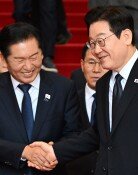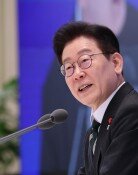[Column] People weeping in hearts
[Column] People weeping in hearts
Posted August. 17, 2000 14:12,
Tears that the long-separated people shed Wednesday were of joy and excitement. Also they are tears of grudge that has been accumulated over the past 50 years. But tears that they will shed Tuesday will be frustration over for their brief reunions and anguish for another separation with their uncertain reunions in the future. Those who met their long-lost kin have tightly hugged their families and swept endlessly amid the worldwide spotlight of television camera.
On the other hand, there were multitudes of the people who shed tears with no voice behind the scene of the ongoing reunions. Despite all the displaced relatives may be equally painful, there are over 76,000 people who applied for the reunions but dropped out from computer lottery and are waiting for another chances for the family meetings. To be exact, a total of 76,793 applied for the reunions, but only 100 were chosen, and therefore 76,693 people are on the waiting list.
Besides, there are another group of people who are weeping in hearts. They are families of the kidnapped people by North Korea and prisoners of war (during the Korean War). In particular, among the kidnapped are mostly South Korean fishermen who were forced to go to the North without committing an crimes. Their families deplore that they even are unable to know whether they are alive or not. They may want to ask if the inter-Korean relations are really thawing?
There are other people who are shedding heart-breaking tears and who are watching the scenes of the family reunions with mixed feelings. They are the very women and their sons, who lost their husbands and fathers because of various terrorist actions perpetrated by the North Koreans during the course of hot war and cold war for the past decades.
At any rate, the ongoing family-reunion program marking the 55th anniversary of the National Liberation in 1945 is the symbolic event to usher in the new millennium of national reconciliation and cooperation, overcoming the confrontations between the South and the North. In order to develop the inter-Korean relationship into a new phase, Korea must mobilize the national energy demonstrated by the current family-reunion project for surmounting the national division. This task should be engineered by the leaders of the nation. Domestically, grand national reconciliation needs to be achieved. In his commemorative address on the August 15 National Liberation Day, President Kim Dae-Jung asserted that there is no reason for the people in the South not to achieve inner reconciliation, while the South and North Korea is moving toward inter-Koran reconciliation and cooperation.
However, our reality runs counter to this proposition. That is to say that mutual complications are prevalent over reconciliation. For instance, when the entire people were watching television scenes of the family reunions and various festive events were being held to mark the liberation day anniversary, on August 15, some 20,000 workers got together at the Taehak-ro (university streets) in the afternoon. They were there to attend a nation-wide laborers` mass rally to struggle against the security authorities` "political suppression" of the workers, sponsored by the Korean Confederation of Trade Unions (KCTU). The demonstrators planned to force a protest march toward the busy Kwanghwa-mun intersection in that night, but withheld the plan and dispersed at the Ulchiro entry section in the face of the police cordon. Why did they attempt to march into the Kwanghwa-mun streets, where commemorative events were scheduled to be held, while the family-reunion event was under way? They might think that the development of the inter-Korean ties is not everything and vent anger over what they contend the government`s crackdown on the labor movement.
KCTU chairman Dan Byung-Ho is staging a sit-in strike for the past 20 days. The federation`s demand boils down to the pullout of the riot police from the Hotel Lotte and the Korean Health Insurance Corporation and the dismissal of Lee Moo-Yung, a police station chief, accountable for the crackdown on the striking unionists, and a government apology for the suppression and for police beating of KCUT chairman Dan. The labor dispute at Hotel Lotte is dragging for two months, incurring huge amount of loss to the hotel and the employees.
Of course, the rival sides have reasonable claims. The police contend that there were no excessive actions against the striking unionists and that the enforcement of the duty was legitimate. But there is no denying that the riot police wielded violence against the subdued strikers during their assaults on the hotel, as was seen in the television scenes.
Basically, there is another, main reason for the angry workers. That is, the gap between the rich and the poor has becoming wider in the course of the financial crisis and the related IMF bailout program, and the irregular, temporary workers increased compared to regular, salaried men, although the unemployment ratio was reportedly curbed at 3-percent level. As a result, the workers and petty citizens are suffering from deepening hardships of life. It is rather natural for the democratic society to experience various complications, small or large. But maturity of the society depends on how well can it solve and coordinate these complications. And it is the political knack to resolve them wisely.
Nonetheless, since the parliamentary railroading the National Assembly revision bill through the Steering Committee, the politics were virtually lost. There are no politics, even in the face of the dismal situation in which serious patients are unable to receive proper medicare service for a long time, due to the doctors` strikes in association with the government implementation of the revised Pharmaceutical Law separating the professional roles between the doctors and pharmacists.
Politics must be conducted in a way to wipe off tears of those who weep in their hearts. At the end of the four-day family-reunion program, we should cast eyes on our inner problems. The potential for the unification must be fostered within ourselves.







